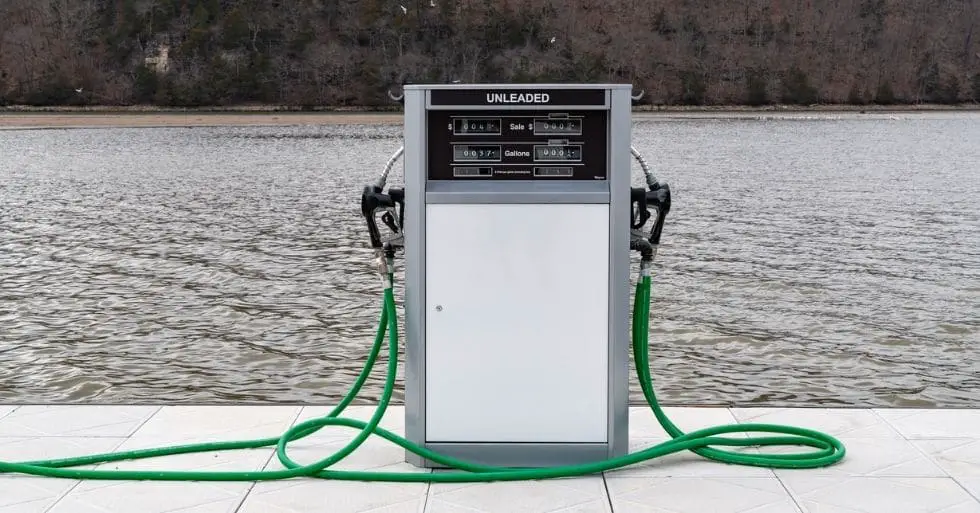When it comes to fueling up your boat, the same type of fuel used for cars is generally used for boats as well. You can even go to automotive gas stations and fill up a boat with fuel. However, you may need to be wary about octane ratings and ethanol levels.
Boats use either regular gasoline, premium gasoline, off-road diesel, or bunker fuel. Small personal boats usually use regular gasoline with 10% ethanol or lower. Large boats like yachts usually use off-road diesel. Very large commercial vessels like barge ships usually use bunker fuel.
Some performance motors and older motors require premium gasoline (90 octane rating or more). So, if you believe you have a sports motor, check your owner’s manual and look for fuel requirements to make sure you use the correct fuel. If you’re unsure, always go with a no ethanol premium fuel.
If you want to see a more specific article about what fuel you should use for your exact boat (including octane ratings and such), check out this article. Otherwise, use the table of contacts below to click on the boat fuel type you want to learn more about.
Gasoline
Most personal boats run on gasoline (at least in the USA). This includes various boats from bass fishing boats, ski boats, center consoles, muscle boats, and many more. In addition, almost all outboard motors use gas as fuel, and many inboard and I/O use gas as well.
You need to know about two different categories of gas for fueling up a boat. These include ethanol rating and octane rating. Continue reading to find out more about them:
Does ethanol rating matter?
You can’t just put any type of gasoline into your boat engine because marine engines are very susceptible to ethanol damage. This is because ethanol can bind with water and cause phase separation. Phase separation causes your engine to corrode and can even cause engine failure.
So, to avoid this, it’s recommended to use ethanol-free gasoline only in marine engines. However, 10% ethanol gas can be used for most modern engines, but you’ll want to then add a fuel stabilizer such as this one to make sure your engine doesn’t get damaged. Also, a water separator filter such as this would help.
Never use E15 or E85 gas in a marine engine. Marine engines aren’t meant to handle high levels of ethanol like those fuels contain.
Always check your owner’s manual to get the best guidance for your exact motor type.
Does octane rating matter?
Few sport marine engines may require premium gasoline with a high octane rating, so it’s always recommended to check your owner’s manual for fuel requirements if you believe you have a sport engine. However, for most boats, a regular octane rating of 87 is all you need.
Note: 87 octane in other parts of the world besides North America is measured at 90 RON.
Even the 600-horsepower V12 Mercury Verado only requires 87-octane fuel, so usually, it doesn’t matter.
However, there may be some cases where you will want to use high octane fuel even if it’s not required. Such as if you’re using ethanol fuel without any fuel stabilizer or you’re using ethanol fuel to store your boat for a while.
Why is gasoline used in most small personal boats?
Gasoline is used mostly in small personal boats. You’ll rarely see boats larger than 37 feet powered by gasoline engines (diesel engines mostly power those). The main reason gasoline is mainly used for small vessels is that they generally weigh less while still delivering a lot of power.
Below I’ve listed all of the pros and cons of using gasoline fuel for boats:
Diesel
Most large personal boats use diesel fuel. This includes yachts, sport fishing boats, sailboats, catamarans, and much more. Diesel engines are almost always inboard or I/O, but there are some outboard diesel engines.
There are generally two types of diesel, including on-road and off-road (red-dyed diesel). Although either type of diesel will work for marine diesel engines, you should always use off-road diesel. Off-road diesel is cheaper because you don’t have to pay any road taxes, so there’s no reason not to use it for boats.
Diesel #1 vs diesel #2 for boats
Along with on-road and off-road diesel, there is also No. 1-D and No. 2-D diesel. Both of these diesel types will work for marine diesel engines, but generally, #2 diesel (No. 2-D) is recommended because it’s cheaper.
The main appeal to #1 diesel is that it handles better in cold weather, but when you’re boating, you probably won’t face any cold weather anyway.
Fuel additive recommended for diesel fuel
Microbial growth is very common in diesel fuel tanks. This is because when diesel comes in contact with water, microbial and other bacteria and fungi begin to grow inside the fuel tank. Jeff Werner from the-troton.com says this about the issue:
Microbial contamination of diesel fuel is a fact of life. It is not a matter of “if”; it is just a matter of “when”.
– Jeff Werner
So to stop this, you need to use bacteria and fungi-killing fuel additives such as this one on Amazon.
Why is diesel used for most large personal boats?
Diesel is mainly used for large personal boats. The main reason for this is diesel engines have very good gas mileage while providing plenty of power to move large boats.
Below I’ve listed all of the pros and cons of using diesel fuel for boats:
Bunker fuel
Bunker fuel is mainly used for large commercial boats such as barge ships. There are three different kinds of bunker fuels including heavy fuel oil (HFO), Marine gas oil (MGO), and marine diesel oil (MDO). All of these are used for large commercial vessels such as barge ships and tug boats.
What’s the most common type of bunker fuel?
Heavy marine oil was the most commonly used fuel out of all of these, but a new law was passed in 2020 that essentially banned the fuel because of how pollutant it was. So now, the most commonly used fuel is switching to marine gas oil as it is within the legal sulfur limit.
Most of these barges and tug ships have engines that can adapt to different fuels, so switching to MGO wasn’t too difficult. However, according to Theo Notteboom, MGO is expected to be 80% more expensive than HFO. So, don’t be surprised if shipping prices rise.
Why do large commercial vessels use bunker fuel?
Bunker fuel is mainly used for barge ships, tug boats, auxiliary vessels, and other large commercial vessels. Almost all bunker fuel is being changed to a cleaner version known as marine gas oil instead of the dirty version known as heavy fuel oil.
The main reason they use this fuel is that it’s cheap. The cheaper the fuel, the more profits commercial shipping companies make. However, this is having a drastic effect on the environment.
Below I’ve listed all of the pros and cons of using bunker fuel for boats:
FAQ
The most popular fuel used for boats is regular gasoline. However, premium gasoline, diesel, and bunker fuel are also used. Never use any fuel with more than 10% ethanol for a boat.
Yes, personal boats (not commercial boats such as barges) use pretty much the same fuel as cars (either gasoline or red diesel). However, gasoline for boats should never have more than 10% ethanol.
Diesel produces the least amount of toxins compared to all other boat fuel types. However, because diesel engines generally power large boats that require a lot of fuel, small gasoline engines will affect the environment much less.
- What Is The Cheapest Way To Store A Boat? - February 28, 2023
- Do Boats Need Bottom Paint? (Uncovering the Truth) - February 2, 2023
- How Much Is Bass Boat Insurance? (Real Quotes) - January 18, 2023


1 thought on “What Fuel Do Boats Use? (All Fuel Types Explained)”
Comments are closed.